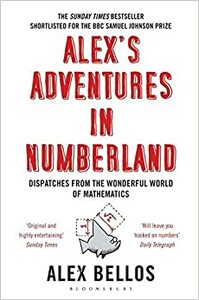You need to sign in or sign up before continuing.
Take a photo of a barcode or cover
117 reviews for:
Alex's Adventures in Numberland: Dispatches from the Wonderful World of Mathematics
Alex Bellos
117 reviews for:
Alex's Adventures in Numberland: Dispatches from the Wonderful World of Mathematics
Alex Bellos
challenging
informative
medium-paced
very interesting but also very intricate. You'd want to give each chapter your full attention as some of the information is difficult to follow. That said I highly recommend the book but just be prepared to reread some chapters a few times before it sinks in.
Didn’t grab me. Expected something more like the excellent Euclid’s Window.
In school, some parts of math were fascinating the me (algebra - everything balances!) and other not so much (geometry - boo for proofs). Bellos makes it all interesting by taking a very journalistic approach to the subject and is unafraid to gloss over some of the more eye-glazing parts. Covering everything from the cultural use of numbers (some cultures don't have numbers for anything over about 4) to zero to infinity.
Some interesting facts:
- We tend to see the world from the POV of a logarithmic scale rather than exact numbers. This could be due to early survival mechanisms and intuition - faced with a group of wild lions, all we need to know is if there are more of them or us, not exactly how many there are. This is also why we're not likely to confuse 1 pint and 10 pints of beer but that billion gallons of beer and 10 billion gallons of beer are fuzzier concepts.
- Time - measured in base 60 (60 seconds in a minute, 60 minutes in an hour) is unusual as base 10 is most common due to its easily divisible nature.
- The word calculus comes from the Latin word for pebble, as counting was with pebbles was popular in Pythagoras' time.
- For 2,000 years the only way to find new decimal places for pi was using polygons.
- "Piems" are poems written under the constraint that the number of letters per word is determined by pi. The most ambitious follows pi for 3,835 digits.
- x became the common symbol in algebra as the printer who printed Descartes seminal geometry book began to ran out of other letters. When the printer inquired of Descartes, he was told x was fine.
There are way more facts in here - every page had some crazy factoid or morsel that was just amazing. My attention started to drift about 1/2 way through, but I think that was more me than the book. Overall, a really interesting read on a subject that isn't known for being fascinating.
Some interesting facts:
- We tend to see the world from the POV of a logarithmic scale rather than exact numbers. This could be due to early survival mechanisms and intuition - faced with a group of wild lions, all we need to know is if there are more of them or us, not exactly how many there are. This is also why we're not likely to confuse 1 pint and 10 pints of beer but that billion gallons of beer and 10 billion gallons of beer are fuzzier concepts.
- Time - measured in base 60 (60 seconds in a minute, 60 minutes in an hour) is unusual as base 10 is most common due to its easily divisible nature.
- The word calculus comes from the Latin word for pebble, as counting was with pebbles was popular in Pythagoras' time.
- For 2,000 years the only way to find new decimal places for pi was using polygons.
- "Piems" are poems written under the constraint that the number of letters per word is determined by pi. The most ambitious follows pi for 3,835 digits.
- x became the common symbol in algebra as the printer who printed Descartes seminal geometry book began to ran out of other letters. When the printer inquired of Descartes, he was told x was fine.
There are way more facts in here - every page had some crazy factoid or morsel that was just amazing. My attention started to drift about 1/2 way through, but I think that was more me than the book. Overall, a really interesting read on a subject that isn't known for being fascinating.
Great book. Fun and interesting look at maths that should be part of school syllabus.
funny
informative
If you are looking for a book on the History of Math that actually reads like a story vs a textbook then this book is for you. Alex Bellos lays math out so that even the most mathematically challenged person would enjoy learning about the history. Math is such an intricate part of our universe and can be used to explain so much. This was a really great read.
This strays so far from my normal read, but I found it very interesting, and Bellos' writing was engaging.
I've been spending the summer feeling like one of the teachers from Pink Floyd's The Wall, forcing my 12 year old to study Algebra in preparation for next school year. It's been shear hell for both of us. Neither of us likes math, but I'm a really stubborn woman & I've been seeking sources that will make math & algebra more accessible, more understandable, maybe even interesting. Who knew? There's a lot out there! YouTube is rich with cool math tricks, etc., and there are some how-to books that explain it well.
This is not a book of practical applications, and I won't make my 12 year old read it - there are some tough spots for sure. Maybe if I forbid him from reading it he will. This is more an exploration of math throughout history and around the world, different ways things have evolved, what mathematicians do for fun - such as adding digits to Pi - and why they do it. It's just a whole lot of interesting!
One of the big take-aways was that plenty of great mathematicians weren't very good at "math". Wish I could deliver that message to a few students who've been turned off by math and their teachers.
I've been spending the summer feeling like one of the teachers from Pink Floyd's The Wall, forcing my 12 year old to study Algebra in preparation for next school year. It's been shear hell for both of us. Neither of us likes math, but I'm a really stubborn woman & I've been seeking sources that will make math & algebra more accessible, more understandable, maybe even interesting. Who knew? There's a lot out there! YouTube is rich with cool math tricks, etc., and there are some how-to books that explain it well.
This is not a book of practical applications, and I won't make my 12 year old read it - there are some tough spots for sure. Maybe if I forbid him from reading it he will. This is more an exploration of math throughout history and around the world, different ways things have evolved, what mathematicians do for fun - such as adding digits to Pi - and why they do it. It's just a whole lot of interesting!
One of the big take-aways was that plenty of great mathematicians weren't very good at "math". Wish I could deliver that message to a few students who've been turned off by math and their teachers.
Started reading it during high school while maths was killing me. Sadly never got the motivation to finish it



